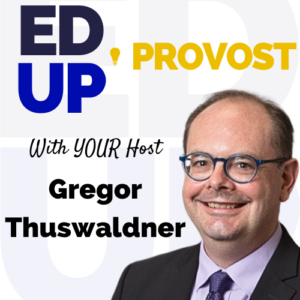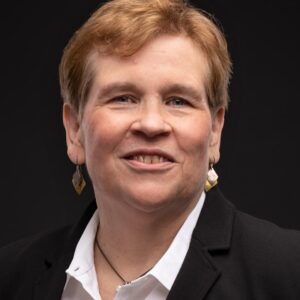Social media has a role to play in the cosmos of higher education, says Gregor Thuswaldner, board member at the Association of Chief Academic Officers. But of all the Facebooks and Instagrams in the ether, no digital medium has helped Thuswaldner understand the evolving sector of higher education more than his venture into podcasting.
The podcast host has developed a voracious appetite for interviewing authors and higher education leaders since launching the EdUP Provost in September. Uploading up to three episodes per week, Thuswaldner and his array of guests have explored the need for cultural shifts in curriculum design, new mentorship models and dozens of other high-level topics.
“I like interviewing people with something important to say. A conversation with an author makes their work more accessible, and it gives you a better sense of where people are coming from,” says Thuswaldner.

On sabbatical until July, podcasting has allowed Thuswaldner to indulge his passion for reading and contribute back to the community. “It’s been a fantastic outlet for professional development,” he says. “The portfolio for provosts is so vast and there’s not always time to read recommended books.”
More from UB: These schools are pioneering AI in student recruitment
Karen Weaver, adjunct assistant professor at the University of Pennsylvania, uses her podcast to help college and university leaders stay ahead of the ultra-competitive landscape of college athletics. “Trustees and Presidents” explores NIL deals, the new legal landscape of the NCAA under the Trump administration and everything in between to help leaders discern where they fall “in the pecking order” of today’s most desired institutions with the rising influence of college athletics on enrollment and reputation.

“With all the change in college athletics today, what a time to have a podcast,” Weaver says. “These long-form discussions allow listeners to understand the issue beyond wins and losses, and how it plays a much bigger role than people realize.”
The podcast hosts admit it took some time and patience to overcome the learning curve to build a steady series. Thuswaldner has had to re-interview a guest before due to a poor microphone. One of his worst fears is accidentally losing a recording due to a storage error.
“It’s all me, from emailing guests to crafting interviews and using tech,” Weaver says. “Sometimes you can tell.”
Interest from other higher education leaders in starting their own podcasts is so great that a conference will be held this summer in Chicago to provide networking and professional insight.
Despite the scrappy production, both have each built a steady base of hundreds of monthly listeners. Thuswaldner: “The feedback I’ve received is extremely positive and encouraging.”



